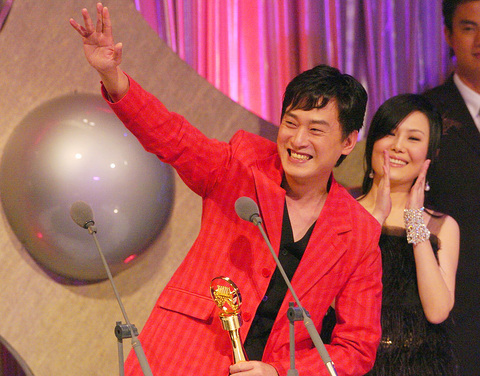A late afternoon thunderstorm interrupted the red-carpet celebrations, but otherwise the 16th Golden Melody Awards took place yesterday without a hitch in Kaohsiung, declaring the year's queens and kings of Chinese-language pop music.
The nominees this year in the popular music categories contained many familiar faces, including Jay Chou (
Following through on their many nominations, Sheng Xiang and Water 3 took one of the evening's first popular music awards, handed to Chung Yung-feng (

Speaking backstage after being handed the award, Chung said, "The fact that I've won this award shows the importance that society now places on the Hakka and other minority groups. This gives me a really great feeling of acceptance." The band later also won the Best Hakka Album Award.
The Golden Melody Awards the Chinese pop music industry's equivalent of the Grammy Awards in the US are held annually to award professionals making music in Mandarin, Taiwanese, Hakka and any of Taiwan's Aboriginal languages. A 36-judge panel is assembled by the Government Information Office, which sponsors the awards.
This year, awards were given in a total of 33 categories, 22 of them in pop music and 11 in classical, tribal, religious and children's music, as well as a special award to honor someone for lifetime achievement in the musical arts. This year's nominees were drawn from 6,208 entrees.

Before the evening's proceedings, thousands of teenagers had braved the intermittent rain showers, crowding the area in front of the city's monumental cultural center to see their favorite stars enter the venue in one of the event's most anticipated rituals. Wang Lee-hom wowed the crowds in a full white get-up decked out with hip-hop-style shiny jewelry and mirror sunglasses.
Most of the grand entrances, however, were of the glamor variety, with men and women alike dressed in classy formal wear. Stanley Huang (
Two of the ceremony's three hostesses Lin Chih-ling (

The third hostess, popular TV show presenter Momoko Tao (
That move broke the ice for a uniquely smooth and upbeat ceremony, despite the continued downward trend of album sales that plagues Taiwan's music industry.
Sales of popular music are down more than 60 percent since hitting a high mark in 1998, leading to a few appeals during the night for people not to buy pirated goods.

In the evening's most sentimental moment, the late comedian Ni Min-jan (
Judy Chiang (
The three-piece pop-rock band F.I.R won the Best Newcomer Award.
Outspoken singer Lotayu (
Winning the Taiwanese Female Singer Award was Sun Shu-mei (
American new-age musician Matthew Lien took an award in the world music category for his album A Journey of Water, which traces metaphorically through music the flow of water from the mountains of Ilan County to the Pacific Ocean.
The alternative songstress Sandee Chen, who had three nominations and on the red carpet dismissed off-hand the notion that she might be nervous about getting an award, received the Best Producer Award. The Aborignal pop rock group Power Station took top honors in the hotly contested Best Duet Group category, beating out the poular group S.H.E and Stanley Huang with Machi.
This year marked the third time that the Golden Melody Awards were held in the southern city of Kaohsiung.

June 2 to June 8 Taiwan’s woodcutters believe that if they see even one speck of red in their cooked rice, no matter how small, an accident is going to happen. Peng Chin-tian (彭錦田) swears that this has proven to be true at every stop during his decades-long career in the logging industry. Along with mining, timber harvesting was once considered the most dangerous profession in Taiwan. Not only were mishaps common during all stages of processing, it was difficult to transport the injured to get medical treatment. Many died during the arduous journey. Peng recounts some of his accidents in

What does the Taiwan People’s Party (TPP) in the Huang Kuo-chang (黃國昌) era stand for? What sets it apart from their allies, the Chinese Nationalist Party (KMT)? With some shifts in tone and emphasis, the KMT’s stances have not changed significantly since the late 2000s and the era of former president Ma Ying-jeou (馬英九). The Democratic Progressive Party’s (DPP) current platform formed in the mid-2010s under the guidance of Tsai Ing-wen (蔡英文), and current President William Lai (賴清德) campaigned on continuity. Though their ideological stances may be a bit stale, they have the advantage of being broadly understood by the voters.

Artifacts found at archeological sites in France and Spain along the Bay of Biscay shoreline show that humans have been crafting tools from whale bones since more than 20,000 years ago, illustrating anew the resourcefulness of prehistoric people. The tools, primarily hunting implements such as projectile points, were fashioned from the bones of at least five species of large whales, the researchers said. Bones from sperm whales were the most abundant, followed by fin whales, gray whales, right or bowhead whales — two species indistinguishable with the analytical method used in the study — and blue whales. With seafaring capabilities by humans

In a high-rise office building in Taipei’s government district, the primary agency for maintaining links to Thailand’s 108 Yunnan villages — which are home to a population of around 200,000 descendants of the Chinese Nationalist Party (KMT) armies stranded in Thailand following the Chinese Civil War — is the Overseas Community Affairs Council (OCAC). Established in China in 1926, the OCAC was born of a mandate to support Chinese education, culture and economic development in far flung Chinese diaspora communities, which, especially in southeast Asia, had underwritten the military insurgencies against the Qing Dynasty that led to the founding of